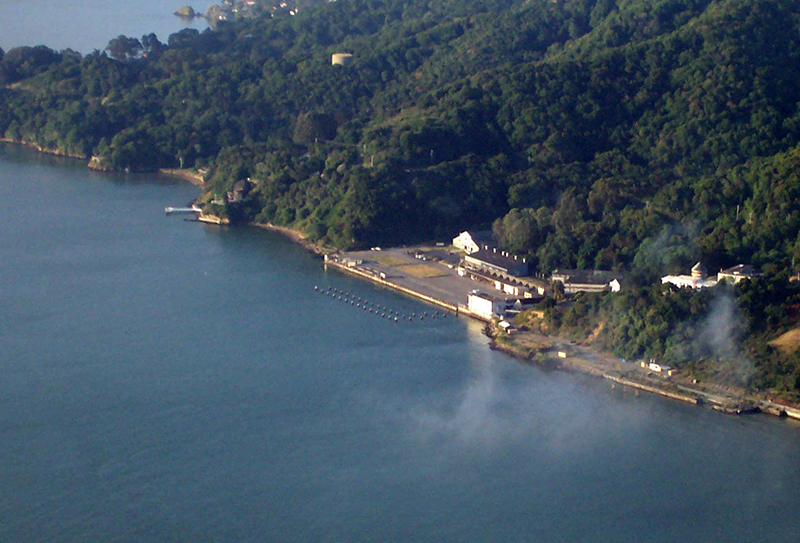NSF-funded program will prepare students to protect urban coasts

Urban coastal regions like the San Francisco Bay Area face several challenges related to global changes, including climate change, sea level rise and ecosystem shifts. A new initiative at SF State’s Romberg Tiburon Center, funded by a $2.9 million National Science Foundation grant, will train students to enter the workforce ready to help these regions adapt to and mitigate these changes.
Romberg center receives $2.9M grant to train professionals prepared to tackle environmental change
As the only marine laboratory located on San Francisco Bay, the Romberg Tiburon Center for Environmental Studies has long played an important role in studying coastal and estuarine ecosystems. Now, the Center will launch a new graduate program, funded by the National Science Foundation (NSF), that will prepare San Francisco State University students to help these regions adapt to global changes such as climate change, sea level rise and ecosystem shifts.
SF State has been awarded a $2.9 million NSF Research Traineeship (NRT) grant for the Research Intensive Pedagogical Training of Interdisciplinary Estuarine Scientists program, or RIP-TIDES for short. The new interdisciplinary master’s program in marine and estuarine science will prepare students for careers focused on finding innovative, evidence-based solutions for the environmental challenges facing urban coastal communities, such as climate change, ocean acidification, sea level rise, introduced and invasive species and coastal development.
Having well-trained professionals able to work in diverse, interdisciplinary teams is essential to addressing these challenges, said Karina Nielsen, director of the Romberg Tiburon Center and a co-principal investigator of RIP-TIDES.
“Urbanized estuaries and coastal regions, including the San Francisco Bay Area, are increasingly vulnerable to the pressures of disruptive global changes,” said Nielsen. “Interdisciplinary science, technology, engineering and mathematics [STEM] professionals are essential for the development and implementation of evidence-based adaptation strategies and solutions that will harmonize human-built and natural environments to support the resilience of coastal ecosystems and communities.”

The Romberg Tiburon Center, where the NSF-funded RIP-TIDES program will be based, is the only marine laboratory located on San Francisco Bay.
Urbanized coastal communities face potentially devastating consequences as a result of climate change, including the destruction of infrastructure that supports local economies and the loss of critical natural resources. RIP-TIDES aims to train researchers who will help coastal communities be better prepared to adapt to and mitigate these problems.
Over the five-years grant period, 40 to 60 student trainees will participate in interdisciplinary courses that will provide an integrated understanding of coastal oceans and estuaries and how they relate to global change, ecosystem services and societal challenges. To enhance the creativity and success of the nation’s future STEM professionals, students who represent the demographic diversity of the Bay Area will be recruited as RIP-TIDES trainees.
Trainees will work with faculty mentors from a variety of STEM disciplines on interdisciplinary independent research projects and with non-academic professionals through internships, developing the diversity of skills needed to address the pressing environmental issues facing urbanized coastal ecosystems.
“RIP-TIDES graduates will be adept at working at the interface of science and society in a time of global change. Our trainees will be prepared to either enter a variety of STEM-related careers in industry or governmental and non-governmental organizations or continue their education in Ph.D. programs,” Nielsen said.
This year’s NSF Research Traineeship (NRT) program was highly competitive: Only 16 of the more than 200 proposed traineeships were funded. "SF State’s award is the first and only such NSF award made to a masters-only graduate training program," said Jonathon Stillman, a professor of biology and the principal investigator of RIP-TIDES.
In addition to Stillman and Nielsen, William Cochlan from the Department of Biology and Tomoko Komada from the Department of Chemistry and Biochemistry are co-investigators on the grant. All are based at the Romberg Tiburon Center for Environmental Studies.
The NSF Research Traineeship Program is designed to encourage the development and implementation of bold, potentially transformative models for STEM graduate education training. The Traineeship Track is dedicated to the training of STEM graduate students in high priority interdisciplinary research areas through the comprehensive traineeship model that is innovative, evidence-based and aligned with changing workforce and research needs.
To learn more about the RIP-TIDES program, visit the NSF website.